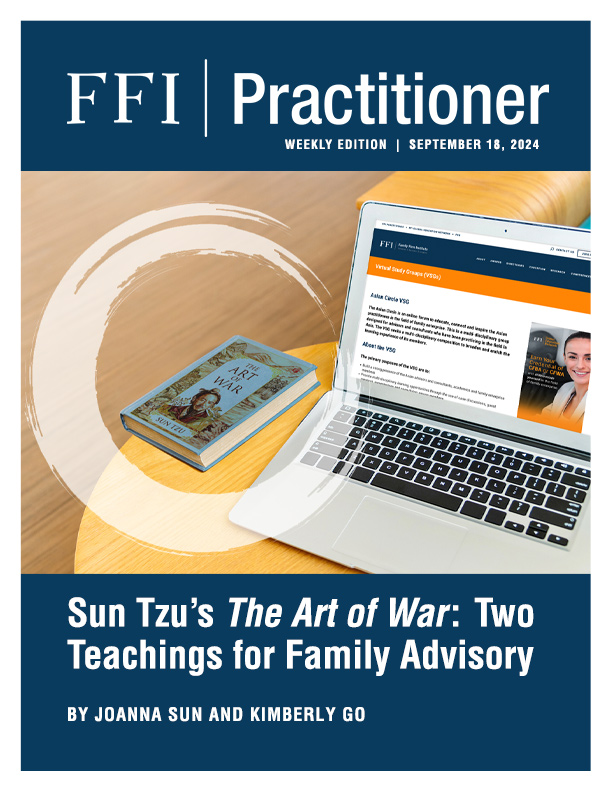
Part of the reason behind The Art of War’s enduring appeal is its influence and relevance beyond the battlefield. Sun Tzu’s principles have been applied to business, politics, sports, and interpersonal relationships. This article explores two of Sun Tzu’s teachings when applied to the family advisory context.
Applying The Art of War to Family Advisory
Certain terms have been adapted to apply The Art of War to family advisory. In the article, “warfare” does not refer to armed conflicts, but rather to the challenges that the consultant and/or family members need to work through during the advisory process. “Enemy” does not refer to a hostile opponent, but to a force or obstacle that prevents the family from reaching their desired outcome. In studying Sun Tzu’s teachings, advisors can learn how to plan for and apply strategy towards supporting changes.
Teaching 1: Laying Plans (始计)
In “Laying Plans,” Sun Tzu directs attention to five fundamental factors that influence warfare:
- The Way (道): The shared purpose that will allow the commander and his/her people to fight willingly and with loyalty.3
- Seasons (天): The timing and conditions determined by natural cycles, like weather and seasonal changes.4
- Terrain (地): The physical geography and strategic importance of the land.5
- Leadership (将): The qualities of the commander, which encompass wisdom, credibility, benevolence, courage, and strictness.6
- Management (法): The organization and control of the army, including logistics, chain of command, and flow of information.7
Teaching 2: Attack by Stratagem (谋攻)
In “Attack by Stratagem,” Sun Tzu contends that strength comes from unity, not size. According to the teaching, five factors are needed to succeed in war:8
- Attack (攻): The methods and tactics used to overcome the enemy, which are based on understanding the reasons behind the attack.
- Strategy (谋): The multi-phased plan to achieve the long-term goal.
- Alliances (交): Partners and supporters who can provide additional resources and strategic advantages.
- Army (军): Military forces or troops at a commander’s disposal.
- Cities (城): Fortifications that can be targets for conquest or strongholds to defend.
Case Study
David is the youngest son in the family group. He has been working as a specialist surgeon in a large hospital for ten years. Though David is hardworking, his father and sister perceive him as spoiled because he enjoys luxury items and a lavish lifestyle. David obtains financial benefits from the family business, but he only works there one day a week. He also receives financial support from his father. David’s entitled behavior has prevented proper succession planning.
“The Way,” or the shared objective between the consultant and the family, was smooth succession planning. Part of the “Strategy” was to raise David’s self-awareness, including helping him see that his conflict with his father was negatively impacting the family business, and to have David acknowledge how much the family had been supporting him financially and non-financially. The “Attack,” in the form of a family strategic workshop with multiple points of discussion, was conceived. During the workshop, the following plan was enacted:
- Present cases of different families facing a similar situation. Ask David where things are going wrong and what he suggests the next gens in these cases do.
- Ask David how he thinks his father has supported him in different ways.
- Ask David to write a list of things he has done to support his father.
- Pause and ask, “David, based on the thoughts that you had on the cases earlier, what is on your mind now?”
- Allow David time to reflect on his response.
- Continue with other topics. In a later one-on-one session with David, refer back to this discussion with him.
In the one-on-one session, David confirmed the side benefits he was receiving from his family and agreed he should reassess his roles and responsibilities in the family business. Momentum was maintained by referring to meeting minutes where action items and deadlines had been set. David’s action items included reviewing his skills matrix, remuneration, and job description, and formalizing the separation of family and business benefits for family employees. By the end of the session, David had made new agreements.
The principles from The Art of War remain timeless and are not bound to a specific culture, with as much relatability for Eastern families as for Western ones. Advisors will find Sun Tzu’s lessons on maneuvering through conflict and adversity with poise, vision, and efficiency a helpful addition to their toolkit.
References
1 Sun Tzu. The Art of War. Translated and introduced by Samuel B. Griffith and with a forward by B. H. Liddel Hart. Oxford University Press, 1971.
2 National Geographic, “The Art of War,” last updated March 6, 2024, https://education.nationalgeographic.org/resource/art-war/.
3 Sun Tzu et al., The Art of War, 63.
4 Sun Tzu et al., The Art of War, 64.
5 Sun Tzu et al., The Art of War, 64.
6 Sun Tzu et al., The Art of War, 65.
7 Sun Tzu et al., The Art of War, 65.
8 Sun Tzu et al., The Art of War, 77.
9 Habbershon, Timothy G., and Joseph H. Astrachan. “Research Note: Perceptions Are Reality: How Family Meetings Lead to Collective Action.” Family Business Review 10.1 (1997): 37-52. Print. Accessed via https://digitalcommons.kennesaw.edu/cgi/viewcontent.cgi?article=3129&context=facpubs.






